
It took me a while to find an appropriate topic for this week’s article – given the current worldwide situation. Looking at the media landscape and news on all channels, the topic of fear immediately came to my mind.
It is absolutely natural to have fears – fear itself is nothing bad, like any emotion, fear is an important indicator. Whether it contributes or blocks you is highly dependent on how you deal with it. Do you accept it and take it as a hint to take a closer look or does conquer and paralyse you?
When I asked myself the question what it is that actually frightens us deep inside, the following aspects came to my mind:
- Uncertainty: We receive the most diverse – sometimes even contradictory – information from numerous sources – from medical facts to emotional posts to images that touch us but are not very meaningful when viewed rationally. Who should I believe? Which source is reliable? What is the next step? And how should I act?
- Volatility: We have experienced it – the situation can change overnight. What was true yesterday will be different tomorrow. How should I plan? What should I expect? On what basis should I decide?
- Complexity: there are numerous factors that play a role and influence the course of events and decisions at all levels: medical, political, economic, personal … and I have little knowledge of most of them – and even less influence on most of them.
All of these aspects affect two of our most basic needs:
- Security: the need for physical and emotional integrity, paired with the desire for dependability and predictability.
- Dominance: the need for self-efficacy, for shaping situations, control over what happens and successful action.
And then it struck me that I have already encountered these phenomena in another context – namely in business life.
For some time now, we have been talking about the VUCA world in the workplace. A world characterized by volatility, uncertainty, complexity and ambiguity.
Situations change from one day to the next (volatility), how they change and what will come is often uncertain (uncertainty) – also because numerous factors have an influence which either only become known afterwards or whose influence cannot be assessed (complexity) – which in turn leads to the fact that learning from past experiences is only possible to a limited extent, as these can be interpreted differently (ambiguity).
Thereupon I asked myself the question whether the qualities, competences and behaviours we need every day to navigate well in our “new working world” can perhaps help us in the current situation.
And I think: YES!
That in turn made me happy. Because it means we already have practice! Now it is a matter of keeping level-headedness and cultivating the following attitudes:
- Accepting what is and being open for change: Let’s face it – it is what it is. Complaining about how bad everything is, mourning that everything was better in the past and being afraid of what will be, cosumes valuable energy that we could use better elsewhere. Accepting what is makes it easier for us to cope with volatility.
- Curiosity and the ability to learn and develop: “Fear will guide you the way.” To perceive and accept situations and emotions is the first step. Only after acknowledging what is you can start to change it. The second step is to do a reality check, i.e. to look at the situation objectively. What exactly frightens me? What’s true in all these reports and my assumptions? What is left after deducting all speculations and assumptions? What do the facts say? Curiosity and the ability to develop helps us to deal with uncertainty.
- Focus: What is my goal? What is at stake? What do I really need to know? What is relevant for my everyday life? Where do I get this information from? If we just let all the information and messages that surround us come pouring down on us every day, it’s like leaving the door to our apartment open all day and anyone who wants can come in and help themselves. Setting focus helps us to better master complexity.
- Self-responsibility: Get into action and make a plan. What can you influence? What can you do to create your situation? Forging a plan and acting on it helps in dealing with volatility.
- Support each other: Evolution is cooperation. Just as in the agile world of work, also in other areas of our life the best solutions are usually generated when working together. So we should ask ourselves: What influence does my action have on others? How can I cooperate in a way that it is for the benefit of all?
May we succeed in training these qualities daily to be the lighthouse in the midst of the storm for us and others!
Sincerely,
Birgit
